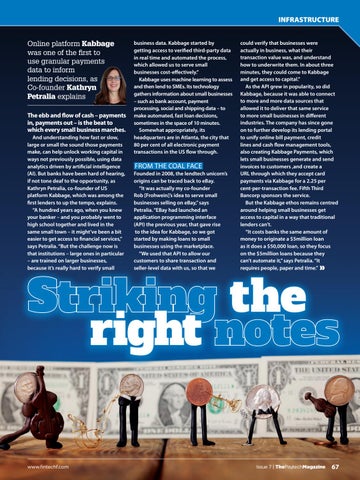INFRASTRUCTURE Online platform Kabbage was one of the first to use granular payments data to inform lending decisions, as Co-founder Kathryn Petralia explains The ebb and flow of cash – payments in, payments out – is the beat to which every small business marches. And understanding how fast or slow, large or small the sound those payments make, can help unlock working capital in ways not previously possible, using data analytics driven by artificial intelligence (AI). But banks have been hard of hearing, if not tone deaf to the opportunity, as Kathryn Petralia, co-founder of US platform Kabbage, which was among the first lenders to up the tempo, explains. “A hundred years ago, when you knew your banker – and you probably went to high school together and lived in the same small town – it might’ve been a bit easier to get access to financial services,” says Petralia. “But the challenge now is that institutions – large ones in particular – are trained on larger businesses, because it’s really hard to verify small
business data. Kabbage started by getting access to verified third-party data in real time and automated the process, which allowed us to serve small businesses cost-effectively.” Kabbage uses machine learning to assess and then lend to SMEs. Its technology gathers information about small businesses – such as bank account, payment processing, social and shipping data – to make automated, fast loan decisions, sometimes in the space of 10 minutes. Somewhat appropriately, its headquarters are in Atlanta, the city that 80 per cent of all electronic payment transactions in the US flow through.
FROM THE COAL FACE Founded in 2008, the lendtech unicorn’s origins can be traced back to eBay. “It was actually my co-founder Rob [Frohwein]’s idea to serve small businesses selling on eBay,” says Petralia. “EBay had launched an application programming interface (API) the previous year, that gave rise to the idea for Kabbage, so we got started by making loans to small businesses using the marketplace. “We used that API to allow our customers to share transaction and seller-level data with us, so that we
could verify that businesses were actually in business, what their transaction value was, and understand how to underwrite them. In about three minutes, they could come to Kabbage and get access to capital.” As the API grew in popularity, so did Kabbage, because it was able to connect to more and more data sources that allowed it to deliver that same service to more small businesses in different industries. The company has since gone on to further develop its lending portal to unify online bill payment, credit lines and cash flow management tools, also creating Kabbage Payments, which lets small businesses generate and send invoices to customers ,and create a URL through which they accept card payments via Kabbage for a 2.25 per cent-per-transaction fee. Fifth Third Bancorp sponsors the service. But the Kabbage ethos remains centred around helping small businesses get access to capital in a way that traditional lenders can’t. “It costs banks the same amount of money to originate a $5million loan as it does a $50,000 loan, so they focus on the $5million loans because they can’t automate it,” says Petralia. “It requires people, paper and time.”
Striking the right notes www.fintechf.com
Issue 7 | ThePaytechMagazine
67
